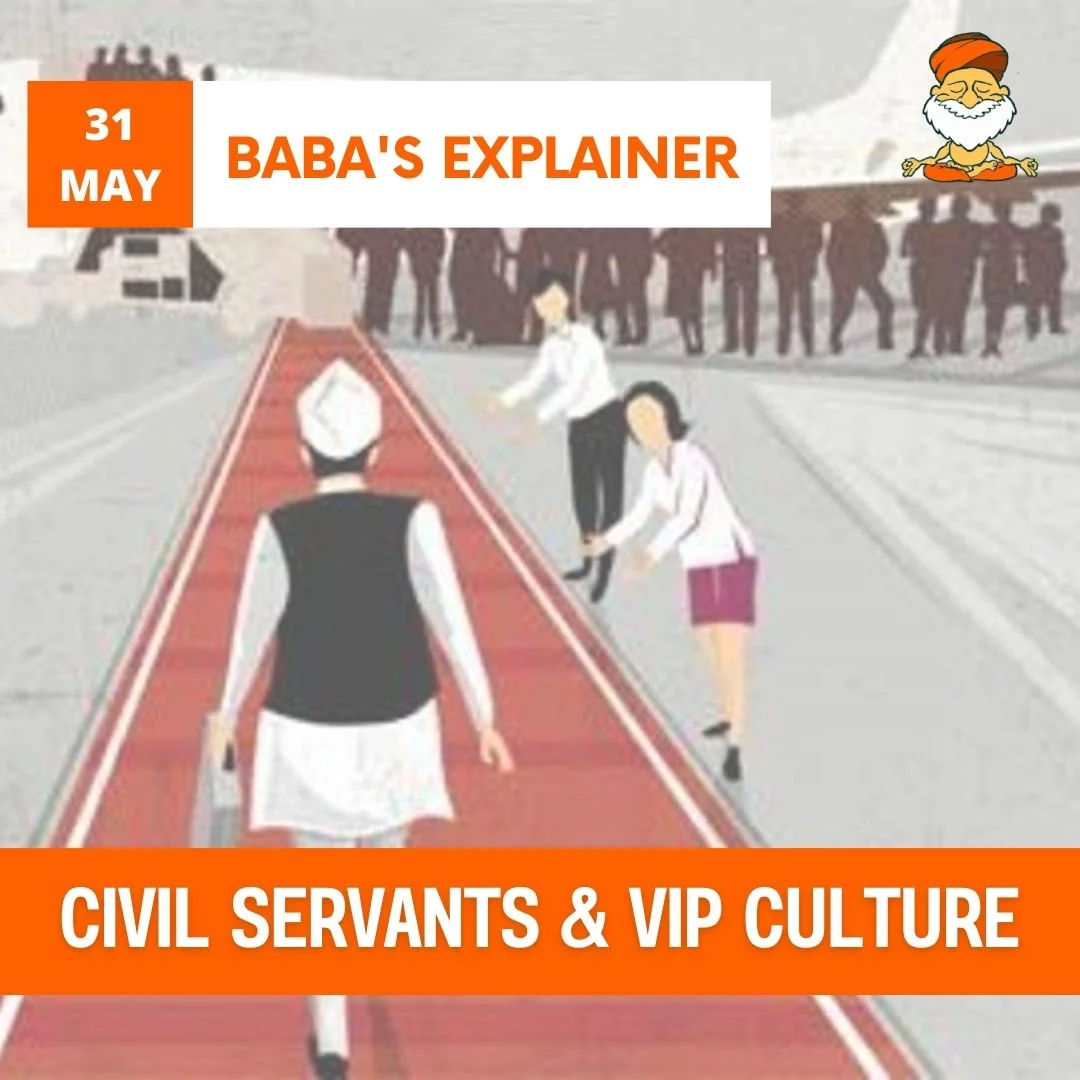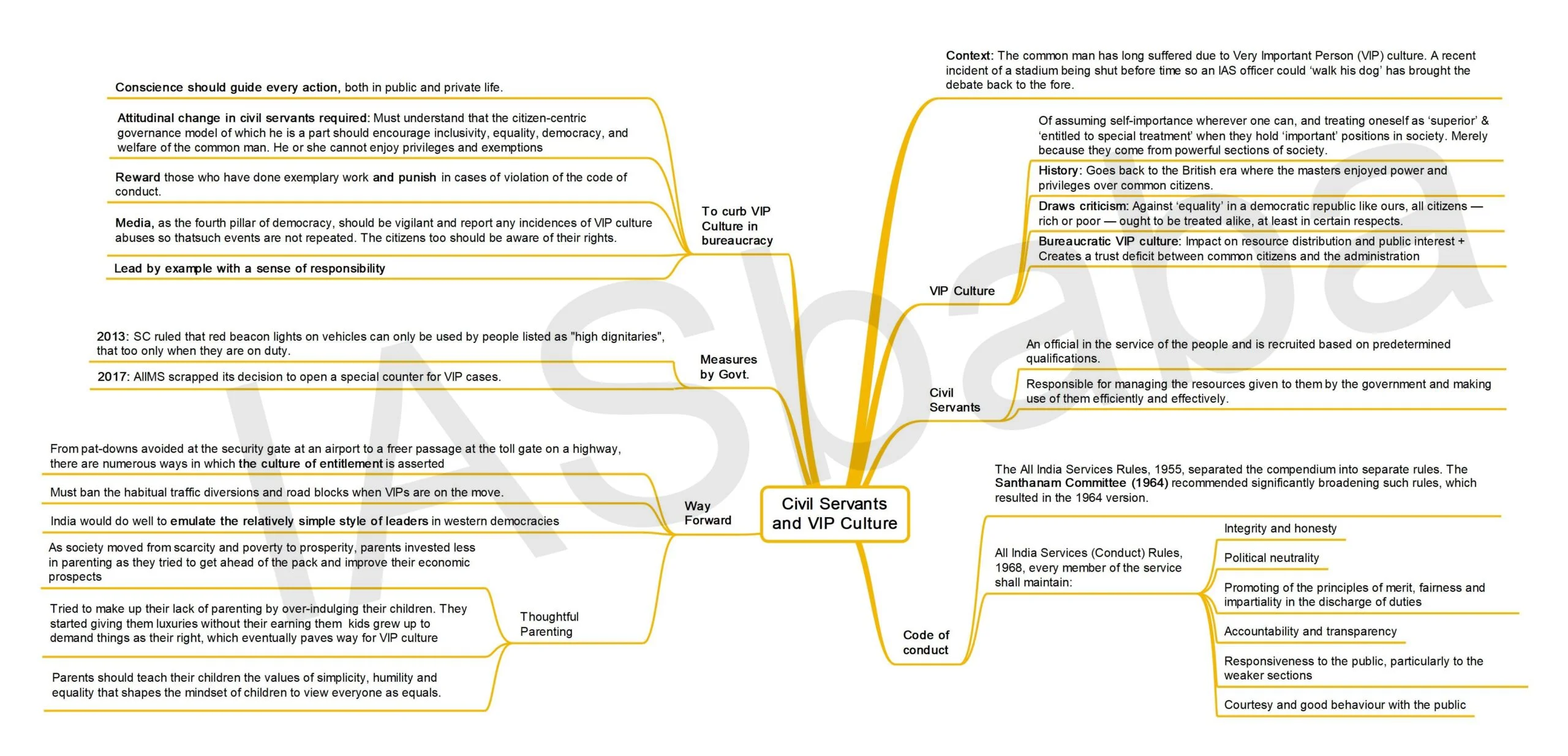Ethics, Governance
Syllabus
- GS-1: Society
- GS-4: Attitude of Civil Servants; Human Values
Context: The common man has long suffered due to Very Important Person (VIP) culture. A recent incident of a stadium being shut before time so an IAS officer could ‘walk his dog’ has brought the debate back to the fore.

What is VIP Culture and what are the reasons for it?
- VIP culture is that of assuming self-importance wherever one can, and treating oneself as ‘superior’ & ‘entitled to special treatment’ when they hold ‘important’ positions in society.
- There is a sense of entitlement merely because they come from powerful sections of society. For those who belong to the elite club it means no standing in queues, preferential treatment in availing government services and even disregard of the law.
- The history of VIP culture in our country goes back to the British era where the masters enjoyed power and privileges over common citizens.
- Everyone secretly, and sometimes not so secretly, wants to be that VIP who has people opening doors for him, garlanding him, standing in queues for him and cleaning up his spilt coffee.
- The behaviour of Indian ‘VIP’s is not a reflection on those individuals alone, it is also a rather dim reflection on the feudal mindset of the citizenry which finds it necessary and appropriate to treat someone as so important as being above and beyond everyone else.
- Even people who are normally critical of such behaviour often bend over backwards when they have an opportunity to please someone holding a seemingly important office.
Why VIP culture is criticised?
- At the heart of VIP culture debate is ‘equality’. And by equality we mean not merely formal equality (of equality before the law and the equal protection of the laws). There is a moral facet to it as well. The argument, which has a moral force, is that in a democratic republic like ours, all citizens — rich or poor — ought to be treated alike, at least in certain respects.
- Bureaucratic VIP culture has impact on resource distribution and public interest. The undue bureaucratic privileges and exemptions may lead to inequality and unfair use of limited resources in the country. Such privileges cost a lot of trouble to common citizens.
- VIP culture by politicians & bureaucrats eventually creates a trust deficit between common citizens and the administration. It bring a bad name to the whole system and becomes a big question of integrity.
Who are civil servants and what is their expected role?
- In a modern democracy, a civil servant is an official in the service of the people and is recruited based on predetermined qualifications.
- Civil servants are bureaucrats who need to be familiar with the laws and regulations of the country and are expected to act in the best interests of the country and its citizens.
- They are responsible for managing the resources given to them by the government and making use of them efficiently and effectively.
- A sound parliamentary system of government requires civil servants to maintain their integrity, fearlessness, and independence.
- In the 1930s, a collection of instructions containing “do’s and don’ts” was published under the title “Conduct Rules.”
What is code of conduct for civil servants?
- The All India Services Rules, 1955, separated the compendium into separate rules. The Santhanam Committee (1964) recommended significantly broadening such rules, which resulted in the 1964 version. These rules were later revised to incorporate additional behavioural norms.
- According to the All India Services (Conduct) Rules, 1968, every member of the service shall maintain:
- Integrity and honesty;
- Political neutrality;
- Promoting of the principles of merit, fairness and impartiality in the discharge of duties;
- Accountability and transparency;
- Responsiveness to the public, particularly to the weaker section;
- Courtesy and good behaviour with the public.
Is there Code of ethics for civil servants in India?
- In India, there is no code of ethics for civil servants, though such codes exist in other countries.
- We have a number of conduct rules that prohibit a variety of common activities. These conduct guidelines serve a purpose, but they are not a code of ethics.
- While the Conduct Rules contain some general norms such as “maintaining integrity and absolute devotion to duty” and not engaging in “conduct unbecoming of a government servant,” the code of conduct is generally aimed at cataloguing specific activities deemed undesirable for government servants.
- There has recently been a concern that more “generic norms” should be added to the list of acceptable conduct.
- A draft “Public Service Bill” proposed by the Ministry of Personnel, Public Grievances, and Pensions in 2007 seeks to establish a set of generic expectations of civil servants known as “values.” The following are the key “values” envisioned in the Bill:
- Allegiance to the various ideals enshrined in the preamble to the Constitution
- Apolitical functioning
- Good governance for the betterment of the people to be the primary goal of civil service
- Duty to act objectively and impartially
- Accountability and transparency in decision-making
- Maintenance of the highest ethical standards
- Merit to be the criteria in the selection of civil servants consistent, however, with the cultural, ethnic and other diversities of the nation
- Ensuring economy and avoidance of wastage in expenditure
- Provision of a healthy and congenial work environment
- Communication, consultation and cooperation in the performance of functions that is the participation of all levels of personnel in management.
- The draft Bill also includes provisions for a public service code and a public service management code, which define more specific duties and responsibilities.
- A ‘Public Service Authority’ is also envisaged to oversee the implementation of the code and the values mentioned above, as well as to provide advice on the values and the code.
What measures can be taken to curb VIP Culture in bureaucracy?
- Conscience should guide: There cannot be rules and regulations to guide every action. In the absence of any such laws, rules or regulations, conscience should guide a bureaucrat’s decision both in public and private life.
- Attitudinal change in civil servants required: The values of service, integrity, etc. should be the foundational values of a civil servant. He or she must understand that the citizen-centric governance model of which he is a part should encourage inclusivity, equality, democracy, and welfare of the common man. He or she cannot enjoy privileges and exemptions.
- Reward and punish- The government of the day should take action after an inquiry against the officers in cases of violation of the code of conduct. They should be held accountable for their deeds. At the same time, the government should also reward those who have done exemplary work in their service.
- Media and citizens– The media as the fourth pillar of democracy should be vigilant and report any incidences of VIP culture abuses so that such events are not repeated. The citizens too should be aware of their rights.
- Lead by example with a sense of responsibility: It is a must for leaders and administrators to lead by example. Many a time a bureaucrat is seen as a role model for society. His or her public and private life has a very thin boundary. Thus, a sense of responsibility should be realized while taking any action in public or private life.
Has government taken any measure to curb VIP Culture?
Many events and incidences in the past highlight the seriousness of the issue of the VIP culture. The following are some of the examples:
- The Supreme Court’s first strike on VIP culture came in 2013 when it stated red beacons on government cars with “Raj mentality” and ruled that red beacon lights on vehicles can only be used by people listed as “high dignitaries”, that too only when they are on duty.
- AIIMS scrapped its decision to open a special counter for VIP cases. (2017)
- The Government banned the use of red and blue beacons equating them to the symbols of VIP culture.
- The supreme court in Abhay Singh v. Union of India case termed red beacons a “menace”.
- It said, red lights symbolise power and a stark differentiation between those who are allowed to use it and those who are not.
- A large number of those using vehicles with red lights have no respect for the laws of the country and they treat the ordinary citizens with contempt.
What more needs to be done?
- As a symbol of an assault on India’s over-reaching VIP culture, the above measures is a good beginning.
- But to meaningfully begin to dismantle India’s VIP culture, doing away with status symbols such as red beacons is not enough.
- From pat-downs avoided at the security gate at an airport to a freer passage at the toll gate on a highway, there are numerous ways in which the culture of entitlement is asserted.
- We must ban the habitual traffic diversions and road blocks when VIPs are on the move.
- Every urban commuter is familiar with the interminable wait for some minister or the other to pass by or the security personnel who push traffic to the kerb to make way for a VIP.
- For a country that aspires to a seat at the global high table, India would do well to emulate the relatively simple style of leaders in western democracies.
- Though the privileges are justifiably considered compensation for public servitude, a little less overt display of privilege would allay those negative perceptions.
Can parenting play a role in curbing the mindset of VIP Culture in society?
- As generations grew prosperous and were able to afford the conveniences of life, parenting styles changed.
- As society moved from scarcity and poverty to prosperity, parents invested less in parenting as they tried to get ahead of the pack and improve their economic prospects.
- Parents suddenly loosened up on basic responsibilities, hoping that schools or somebody else will do the job on our behalf even as they chased careers, luxury products, and the good life for themselves.
- But parents also developed a guilt trip about this and tried to make up their lack of parenting by over-indulging their children. They started giving them luxuries without their earning them. Not surprisingly, kids grew up to demand things as their right, which eventually paves way for VIP culture.
- As a result of which many children, especially from elite class, grow into self-indulgent, uncaring, ill-mannered kids that demand attention and instant gratification at someone else’s cost.
- Therefore, changing the parenting style especially amongst the rich & elite sections of society will enable get rid of “the entitlement” mindset that grows into VIP culture. Parents should teach their children the values of simplicity, humility and equality that shapes the mindset of children to view everyone as equals. The best way to pass on these values to next generation is to follow it themselves.
MIND MAP

DOWNLOAD MIND MAP – CLICK HERE











